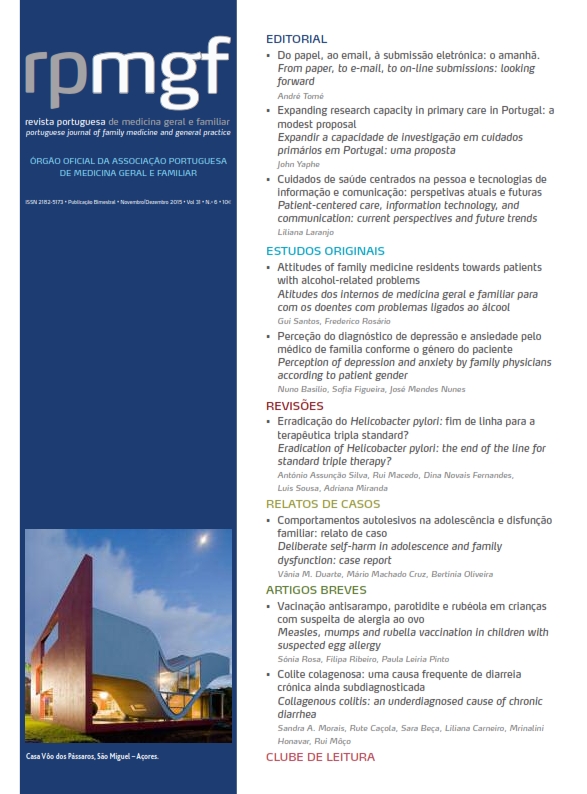Family Medicine residents’ attitudes towards patients with Alcohol-Related Problems
DOI:
https://doi.org/10.32385/rpmgf.v31i6.11490Abstract
Objectives: to evaluate family medicine residents’ attitudes towards patients with alcohol-related problems.
Study design: cross-sectional study.
Participants: family medicine residents registered at the Lisbon’s Family Medicine Residency Coordination.
Methods: attitudes towards alcohol-related problems were assessed using the Short Alcohol and Alcohol Problems Perception Questionnaire. Associations were tested between questionnaire scores, gender and postgraduate training year.
Results: one hundred and ninety five residents meeting inclusion and exclusion criteria answered the questionnaire. The mean residents’ age was 29.2 years, and 74.4% were female. Residents felt role secure in working with drinkers (88.7% scored above Role Security scale midpoint) but reported lower levels of Therapeutic Commitment (57.9% scored above scale’s midpoint). Although residents showed on average positive attitudes, they considered working with drinkers an unpleasant task, since only 22.6% scored above Satisfaction’s subscale midpoint. Male and female residents reported similar attitudes towards drinkers in all questionnaire’s domains (all P>0.05), and their attitudes remain unchanged throughout training (all P>0.05).
Conclusions: residents’ attitudes towards patients with excessive alcohol consumption remain unchanged as they go through residency training. Inclusion of alcohol specific training modules into the residency programme that take residents’ attitudes into account may help to improve residents’ willingness to engage with patients with alcohol-related problems.
Downloads
Published
Issue
Section
License
The authors will assign to the RPMGF the sole right to publish and distribute the content of the manuscript specified in this declaration via physical, electronic, broadcasting or any other medium that may come into existence. They also grant the RPMGF the right to use and exploit this manuscript, in particular by assigning, selling or licensing its content. This permission is permanent and takes effect from the moment the manuscript is submitted, has the maximum duration allowed by applicable Portuguese or international law and is of worldwide scope. The authors further declare that this assignment is made free of charge. If the RPMGF informs the authors that it is not going to publish their manuscript, the exclusive assignment of rights ceases forthwith.
The authors authorise the RPMGF (or any entity it may appoint) to act on their behalf when it believes that copyright may have been infringed.





